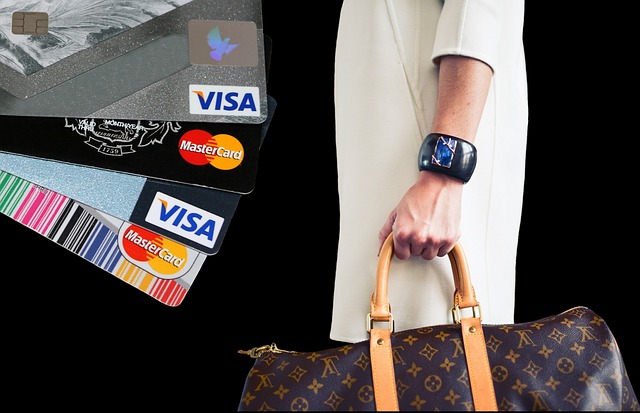
Credit cards are an easy way to pay for things you don’t have every penny for right this second.
Many of them offer great rewards for your purchases as well, like money back for purchases, airline flight points, hotel rewards and more. But choosing the wrong credit card could cause trouble as you attempt to build or rebuild credit.
To make your search easier, we wanted to offer some tips on choosing the right cards, and the top five options available for people with lower and zero credit scores.
How to Pick the Best First Credit Card

Image via Pixabay
As you start the journey of growing and improving your credit score, you need to find the right credit card. There are a few questions to ask yourself and find the right option for you.
1. Figure Out Which Cards Are Available at Your Salary
One of the best ways to start narrowing down the field of thousands of credit cards available is by finding the ones that fit your salary range.
Credit cards have minimum salary requirements because that determines the credit limit you’d be able to support paying off.
Often the cards with the most attractive benefits, such as incredible bonus mile points, will be out of reach for those with a low salary.
2. Match the Card Benefits to Your Lifestyle
Once you have found the cards you’re able to apply to based on your salary range, you’ll want to narrow down your list more by matching the credit cards to your lifestyle.
Most credit cards offer some perks and upsides that compete with each other to get your business. Check out the various benefits each card of interest has and find the ones that match your lifestyle.
For example, if you travel a lot, look for cards with benefits that relate to hotels, airline points, restaurants, and attractions.
Or, if you’re into rewards that rack up points for your everyday purchases, check out credit cards that give points or money off for things like groceries or gas.
3. Know What You’re Getting Into
Before you get that first credit card, make sure you understand the potential consequences of overusing your credit card.
It’s easy to say you know the issues of going wild with that credit card, but it’s something else entirely different when you look at your credit card bills six months later and realize you’ve ruined your credit.
Improper use of credit cards can damage your credit report for years to come, so be sure you understand what your limits are before you get to spending.

Image via PIxabay
4. Prioritize the Cards with No Annual Fees and Low-Interest Rates
Most likely, if you’re looking for your first credit card, you’re working with a lower end salary range. And that means you can’t afford the high-interest rates and annual fees that so many companies charge each year.
Make sure your choice in credit card has the absolute lowest interest rates and avoid any with annual fees.
5. Only Get a Credit Card if You’ve Got a Steady Income
As we mentioned before, credit card companies check your income levels when someone applies.
If you’re looking for a credit card to boost your score, make sure that you can have your income verified – which can only happen if you’ve got cash flow into your bank account.
If you tend to get paid in cash from your gigs or side jobs, be sure to deposit this income in your account so that those figures work into the verification process.
6. Read the Fine Print
Financial companies love the fine print. But that fine print doesn’t always love you. Be sure to read the fine print on things like infractions, late payments, and other issues. You need to know any fines you’ll incur if you’re not entirely spot on all the time with those payments.
7. Choose the Card Carefully
If your income is high enough to earn you the card but low enough that you’re concerned about always making the payments on time, you need to make sure that your payments will be low enough.
Or, if you’re feeling like you don’t have the best impulse control, consider a secured credit card.
And always make sure that you choose the credit card for the value behind the card rather than the cool design or over-the-top rewards.
8. Know What a Secured Credit Card Is
And, speaking of secured credit cards, you should at least know what this term means, even if you decide they’re not a good option for you.
These cards are generally for people trying to improve their credit score or people who want to start building on their limited or non-existent credit.
If you fit one of these two profiles, you’re likely having issues with qualifying for a credit card. They’re not guaranteed, but they may be a great option for seeking approval.
Secured credit cards work through a security deposit given by the cardholder. Many will require something like $300 or $500 down. This then becomes your credit limit with which you can spend.
This may seem a bit odd since most people seeking a credit card are looking for money to spend, but these help you prove your capability to pay off debt in a timely fashion.
Once you make your payments consistently, many of these secured credit cards increase your credit limit without requiring an additional deposit.
9. Don’t Aim Too High
If you think one of the credit cards that requires excellent credit might be a good option, think that through. Every time there’s a hard inquiry into your credit score your credit score may be damaged if you’re disapproved for the credit card or loan.
If you’re not sure what your current credit rating is, be sure to check out a site like Credit Karma. If your score doesn’t rank excellent to good on the site, keep your aim lower on those applications.
How to Apply for Your Best First Credit Card

Image via Pixabay
Once you’ve figured out which credit card(s) you’re interested in applying for, you’re ready to start the application process. Most credit cards have online applications any more, and many of them give nearly instantaneous approval.
However, we’d highly recommend consulting two different types of people as you apply: an older adult whose judgment you trust and someone from a financial institution. Students are particularly susceptible to higher interest rates than others.
After you’ve sought the advice of those you trust, find the paperwork or links for the credit card(s) you’re applying for, and follow the step-by-step process that directs you.
You’ll need to have your social security number handy, as well as other important papers that may be required for your identity verification by the companies.
The Best First Credit Cards We’d Recommend Checking Out
Here are some of the absolute best first-time credit cards we would recommend you consider as you look.

Image via Pixabay
1. For College Students
The Journey Student Rewards card from Capital One is a great option. There’s no annual fee and receives a 5 out of 5 rating from a variety of financial folks with the real know-how.
2. For Cash Back Needs
If you might need cash back options on occasion, the QuickSilverOne cash rewards credit card from Capital One is a great option. The one drawback is the $39 annual fee – this is typical for cards with cash back options, though, so it’s not too bad. If that’s not too high, you may want to consider it.
3. No Credit Check Required
For those needing a credit card without a credit check, you’ll want to consider the OpenSky Secured Visa Credit Card. It has a $35 annual fee, which is normal for non-check credit cards.
4. Secured Credit Card Options
For those needing a secured credit card, you can check into the Discover It Secured credit card. This has one of the lowest minimum deposits around, at only $200. The card also offers a one to two percent cashback reward.
5. General Credit Card Needs
For those without such specific needs, the Capital One Platinum Credit Card is a great option. There’s no annual fee, but it has a minimum credit limit to help you avoid over-spending too quickly.
Take Your Time and You’ll Find the Best First Credit Card

Image via PIxabay
The right credit card is out there. You’ll need to do a little digging, do some research, and look at the fine print of the offers you’ve found.
Be sure to consult folks who know something about money and debt, and take the time you need to find the right card
Featured Image via Pixabay
Leave a Reply